“…in jazz, numbers don’t mean anything, because within 16 bars, we’re the same age.”
Pannonica de Koenigswarter, the Rothschild heiress who served as a benefactress, muse, and friend to jazz legends including Thelonious Monk, Charlie Parker, and Bud Powell, asked 300 musicians what their three greatest wishes were. In the 2006 book of de Koenigswarter’s photos, “Three Wishes: An Intimate Look at Jazz Greats,” edited and published posthumously by her granddaughter Nadine de Koenigswarter, vibraphonist Terry Gibbs is quoted as saying that he wanted his own nightclub, where he could pop in and play whenever he wanted.
Gibbs, who will turn 96 on October 13, said that he never would have had the time to indulge in such a luxury. Indeed, the whole world became his personal nightclub, as he played alongside and led a roster of the greatest jazz musicians in history.
“I was too busy for it to happen,” he said in a 2018 interview at his home in Sherman Oaks. “I’ve been very fortunate that I’ve been busy playing music, conducting [on] television shows, writing my book or writing music all my life.”
The irrepressible Gibbs, whose 2003 autobiography, “Good Vibes: A Life in Jazz,” (with Cary Ginnell) won the ASCAP Deems Taylor Award for Best Book in 2004, thinks that every jazz musician should not leave telling his or her story to biographers.
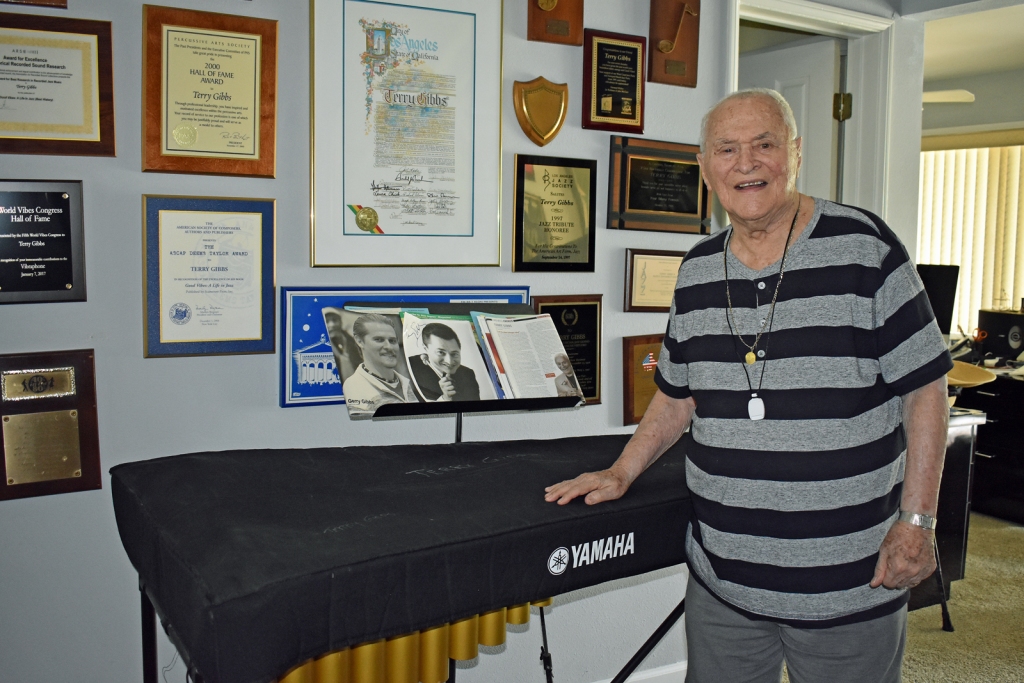
“I wrote an autobiography, very anecdotal,” Gibbs said. “I love George Gershwin and I have all of these books that people write about him. There are some of the same stories but they’re not [all] the same.
“I think that every jazz musician, every entertainer, should write their autobiography. It should come out of their mouth. very musician, with all the traveling we do, all the places, all the fun, and all the bad things that happen, all the good things that happen. For example, when I worked with Buddy Rich, we got $15 a night. So, when we’d check into a hotel, one guy would check in and four guys would come up, and we’d take the mattress apart and fall asleep. All of these things are funny and interesting to read about.”
From his own humble beginnings in Brooklyn, to serving as musical director for “The Steve Allen Show,” to now being one of the last living pioneers of bebop, Gibbs’ story spans nearly a century of jazz as he made his own mark on the music alongside the likes of Benny Goodman, Charlie Parker, Buddy Rich, and Woody Herman.
Gibbs put his mallets down permanently after releasing “92 Years Young: Jammin’ at the Gibbs’ House” in 2017 – with son Gerry Gibbs on drums, John Campbell on piano, and Mike Gurrola on bass. Gerry Gibbs leads his eponymous Thrasher Dream Trio, with Kenny Barron on piano and Ron Carter on bass.
In a recent phone conversation, Gibbs mentioned that August 29 of this year would have been Charlie Parker’s 100th birthday and noted that, “I am the oldest bebop player living today, where I used to be the youngest. I’m going to be 96 years old in October.”
Although Gibbs is no longer making music, his storytelling still swings. In August, 2020, presented by the L.A. Jazz Society via Zoom, he shared his experiences of his 84-year career, from playing his 45-second rendition of “Flight of the Bumblebee” on the xylophone and winning the Major Bowes Amateur Hour Contest at age 12, to touring professionally as a drummer and percussionist until his affinity for bebop led him to return to the vibraphone and eventually become the “#1 Vibraphonist in the World,” in both Downbeat and Metronome polls from 1950 to 1955.
Gibbs’ TV credits include leading a band on a show hosted by Mel Torme – which was the first television show in color – “That Regis Philbin Show,” “Operation Entertainment,” and most famously, “The Steve Allen Show,” “Steve Allen’s Music Room,” and “Steve Allen’s Comedy Room.” The Terry Gibbs Dream Band was named “Best Band in the World” in Downbeat’s 1959 Critics’ Poll. Gibbs has 80 albums to his credit and is the composer of more than 300 works.
In the 2018 interview, Terry Gibbs looked back at his 93 years, during which – to paraphrase Allen’s famed theme song – the vibraphonist, civil rights champion through music, and born storyteller, always found himself at “the start of something big.”
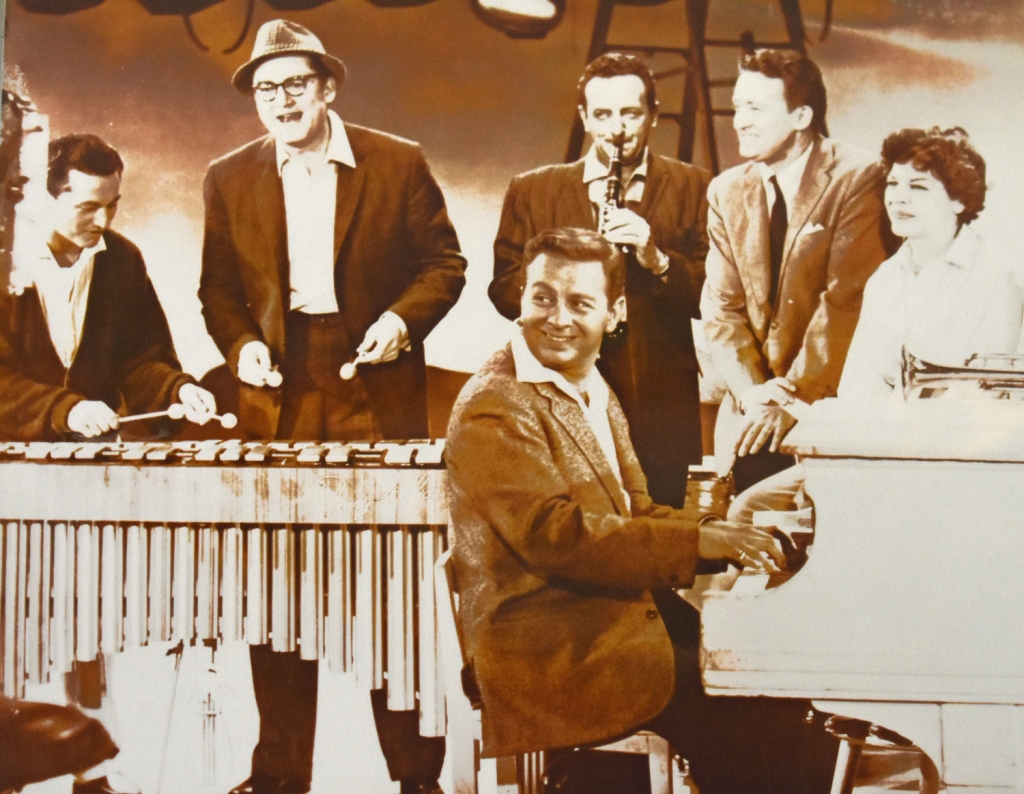
What was it like working for Benny Goodman?
When I was a kid, Benny Goodman was the biggest name in the world. He was more famous than the President of the United States. Swing music and dancing were the the most popular thing, it was the music of the day. You had jukeboxes and what they call ice cream parlors. The jukeboxes – every record was Count Basie, Benny Goodman, all the big bands.
I left the Woody Herman Band after being there a year. I couldn’t find a job because I was [playing] that music of bebop and they thought that beboppers were junkies.
So, I didn’t work for about six months. My ex-wife and myself had to be the janitors of a ground floor apartment at 124th Street and Pleasant. On the ground floor, you had people walking above, and the room was a long one-bedroom and kitchen apartment. All we had to do was show apartments.
I got a call from Benny Goodman’s office that Benny would like me to join his sextet – there was no audition. I went to the first rehearsal with Teddy Wilson and heavyweight people that I grew up idolizing and we played.
I was in my early 20s, and Benny was in his 40s. In jazz, numbers don’t mean anything, because within 16 bars, we’re the same age. You’re playing the same music. In sports, you start out by being a rookie and work your way up to the major leagues, which could take years. In jazz, you would not get hired by the person calling you if you weren’t good enough to play with him, and Benny Goodman called me.
We’d start out by doing a television show. I went to the first rehearsal and asked where the music was. He said, “‘There’s no music. You know the song, Pops?’” Whatever songs we rehearsed, we played on the show. So, it was fun playing with Benny Goodman. Except, he started out paying me $75 [a week]. This was 1950 – $75 would be $175 today.
“Benny Goodman” was a magic name. Every contractor, every producer of television or music, thought if you could play for Benny Goodman, there wasn’t anything you couldn’t do, because Benny did hire good musicians. Look at the people that came out of his band: Gene Krupa, Teddy Wilson, Lionel Hampton, Ziggy Elman, Harry James, and Charlie Christian.
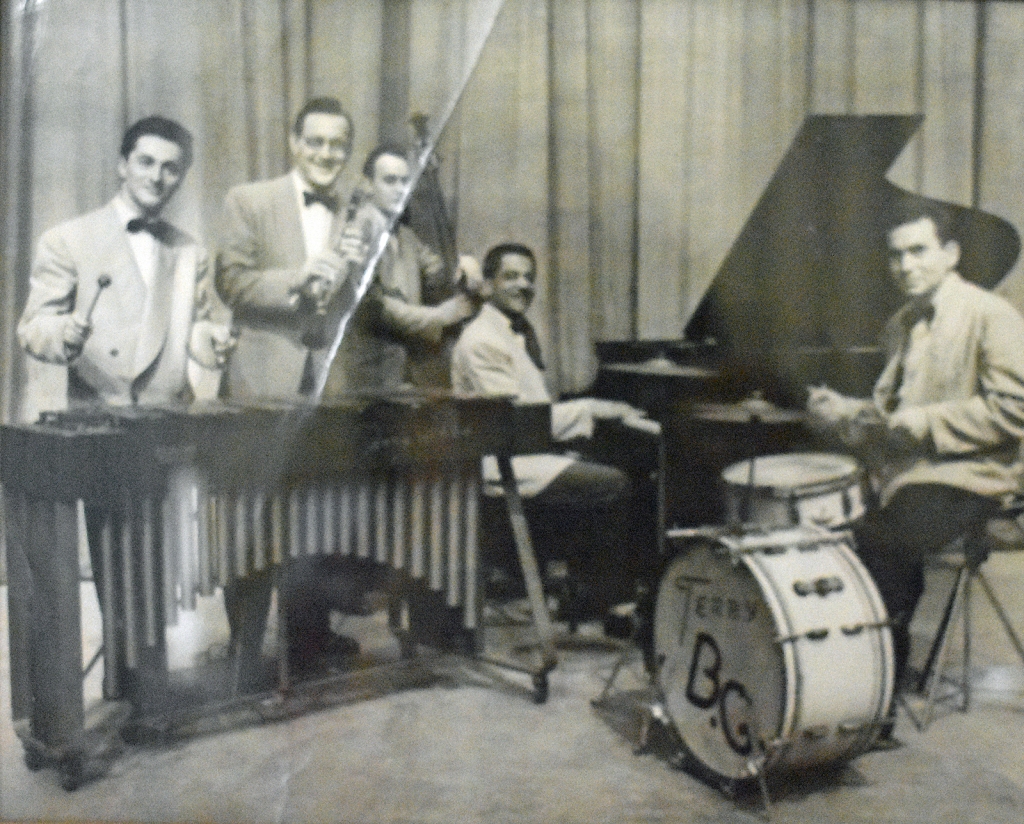
And then, I started to get calls to do record dates, so I was going to quit. I played clubs at night but I couldn’t do anything else in the afternoon because of rehearsals.
Teddy Wilson and I became very good friends. I told him, “Teddy, I’m going to have to leave. I’m not making any money.” He said, “What do you have to have?” I said, “Make it $175.” He said, “Go ask Benny for $300. I know Benny.”
Benny had a way of staring you in the eye. He doesn’t even know you’re there. And if you look him back in the eye and keep talking, you’ll talk yourself into less money. Teddy said, “Don’t stare him in the eye.” So, I just looked at his shirt and I said, “Benny, I’m getting very busy now with studio calls and I’ve got to leave.” He said, “What do you have to have?” This was hard for me to say – I said, “I have to have $300 a week.” He said, “Come on, Pops, you couldn’t get more than $175.” He hit it right on the head. Teddy Wilson knew what he was talking about.
I played a few more weeks. I started to get calls for record dates which would have made me $300, $500. So, I went to Teddy again. He said, “What do you have to have now?” I said I could be making $300. He said, “Go ask Benny for $500.”
I went to Benny – “I’m getting too busy, I’m going to have to give my notice.” At that time, the band was so good that I didn’t really want to leave. In fact, there’s a video of the show on YouTube, it’s called “Star Time.” You can see the whole four or five performances we played on. The producers were starting to like me because I had a lot of energy and I was making even Benny play better. I was a bebop player. But bebop is a form of swing. You just articulate your notes differently and you play different chord changes sometimes. And technically, play the instrument well and you have to have the ears for it.
By the way, [Benny] loved my last name – Gubenko. He called me “Gubenko.” But when I asked for a raise, it was “Pops.”
I said, “Benny, I can’t make it on this, I have to have a raise.” He said, “What do you have to have now?” I said, “I gotta have $500.” He said, “Come on, Pops. A show like this… $300 is all I’m going to give you.” So I got my $300.
Teddy Wilson told me this story. When Teddy worked with Benny, Benny called him and asked Teddy to an afternoon party at this estate. He told him [to wear] “black tie.”
So, Teddy got there and he was the only one with a black tie besides Issac Stern, who had a bow tie on and the drummer and bass player had bow ties on also. Everybody else was wearing shorts and had tennis racquets. So, Teddy knew why he was invited there, and that was to play the piano.
Teddy took him in the other room and said, “Benny, I want to talk to you. I’m glad you invited me, it’s an honor – with Issac Stern, all these people, it’s great. But if I play one note on the piano, it’s going to cost you $1,000.”
So now, I was really going to leave. I was there for 16 weeks. I loved what I played with Benny – it was swinging, it was fun. He would call out a song and we’d rehearse it. Playing with Benny Goodman was like a jam session. He’d play the melody, I’d noodle, and we’d play choruses. At rehearsals, we’d make up a last chorus.
I was getting calls to do Birdland, all the big clubs, as a leader, not as a sideman. I went to my advisor Teddy Wilson and said I really had to leave this time. He said, “Would you stay if you had more money?” I said, “Of course I’d stay.” He said, “What do you have to have?”
I said, “I’d like to have $500 because I’m getting that many calls. You’d do a studio date and at that time, you’d get $200 – that’s like $700 today. It winds up to be more than you would make in a week with Benny, but you don’t get that feeling. So, he said, “Go ask Benny for $800.”
I went to Benny and I told him I was going to leave because I needed more money. Now he’s stopped calling me “Gubenko” and went back to calling me “Pops.” He said, “What do you have to have?” I’m looking at his shoes now, I’m not even getting close to his face. And I couldn’t say $800. I said, “I have to have $750.”
He said, “Let me tell you – this is the last raise you’re getting. I’m going to give you $500.” He gave me my $500. I was there until the show ended.
Monte Kay started Birdland and hired me to play there. There would be three attractions at that time – Duke Ellington, Dinah Washington, and Terry Gibbs. Or, Count Basie, Sarah Vaughn, and Terry Gibbs. Or, Charlie Parker, Dizzy Gillespie, and Terry Gibbs. When [you’re with] talent like that, it’s big time. I had the chance to play with all of them.
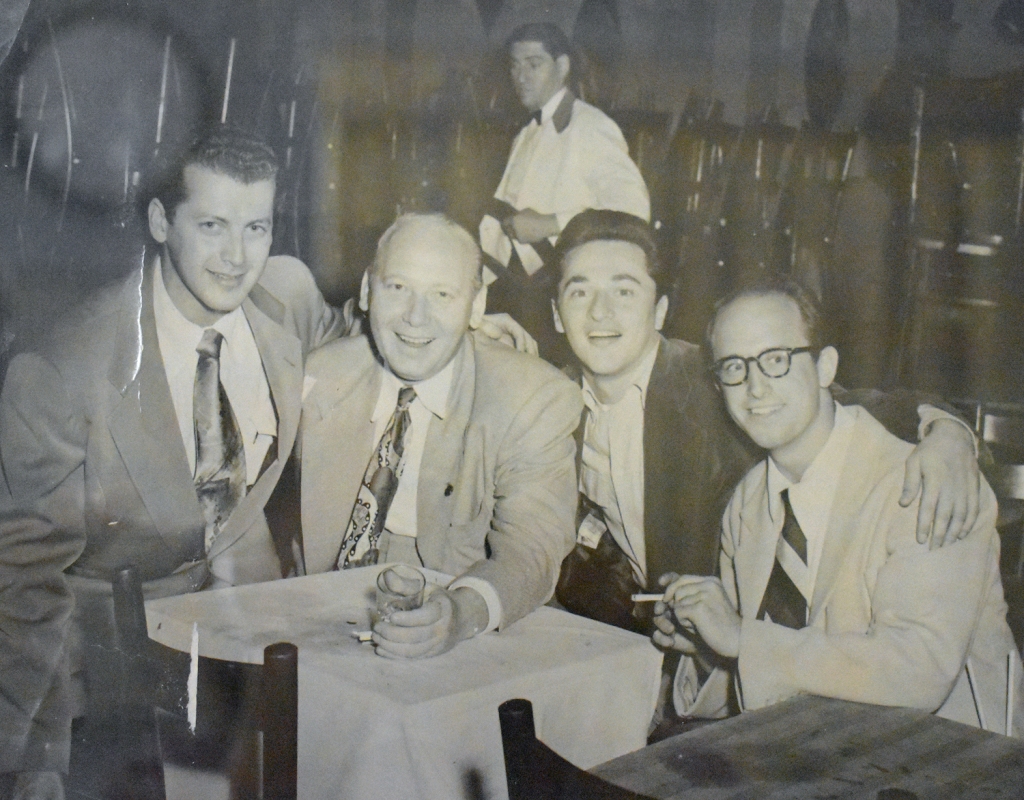
How was Charlie Parker an influence on you and your contemporaries?
He was way far ahead of anybody in music – to me, the greatest jazz musician who ever lived. As we grow up, we all find people who we learn from and copy from. Whatever Charlie Parker played, we couldn’t find who and where he came from. He was only six or seven years older than us, but musically, he was like a thousand years ahead.
For example, the Four Brothers – Al Cohn, Zoot Sims, Stan Getz, and Serge Chaloff – had their own style, but they came from Lester Young. Charlie Parker, we couldn’t find out where he came from. He listened to Lester Young, so maybe he had a bar or two of “Prez” in his playing. But what he did was something nobody ever heard.
Indirectly, I think that Charlie Parker was responsible for a lot of musicians becoming dope fiends. The young kids couldn’t figure out what was making him play that good, so it had to be the dope. We couldn’t find anything else that could make Bird play like that, so they tried dope. Fortunately, I was one of the kids who never tried dope. I’m afraid of needles. If I go to the doctor to get a shot in my fanny, I’ll run around the room and he has to catch me.
What was your experience at Birdland?
When I became a bandleader, I hired the greatest players. I had two piano players – Billy Taylor and then I had Horace Silver. George Duvivier and Percy Heath played bass. For drummers I had Charlie Smith, who is the only drummer on a TV show with Charlie Parker. I had Phil Urso on tenor sax and Don Elliott, who played mellophone and vibes. We became the hit of New York.
I was working opposite George Shearing at Birdland and Don Elliott was playing vibes with George. It was about four o’ clock in the morning and there were about ten people left. And so, I asked Don to come up and we played together. When we finished, the ten people sounded like a thousand people applauding.
I said, “Don, if you ever leave George Shearing, give me a call, I’d like to have you in my band,” because Don played mellophone besides playing the vibes. So about eight months later, Don joined my group, playing the mellophone and we would close playing a vibes duet. That was such a housebreaker that it kept us working more than most groups in New York. And later on, whoever I hired to play piano, being they knew chord changes, I taught them technique and how to move around the vibes.
I had good piano players who learned how to play the vibes. Terry Pollard, who played with me, who could play the piano and vibes, was with me for four years. In my estimation, I don’t think there is a vibes player today – and there are some good ones around – who could swing as hard as Terry Pollard and play as good as she did in 1953. She was amazing.
There’s a video of us on YouTube. In the video, because it was a television show, she only played two choruses and I played two choruses. But in the club, I let her play ten, 15 choruses, one after the other. She played that good. And she was a monster piano player. She took Horace Silver’s place in my band, so you know she had to be good.
We went to Ohio to break in the group and then to New York. The first night we played, Charlie Parker offered her a job after he heard her play. I thought I would lose her, she was that good where guys who were bigger names than I at the time wanted to hire her. But she stayed in my band for four years and also recorded with me.
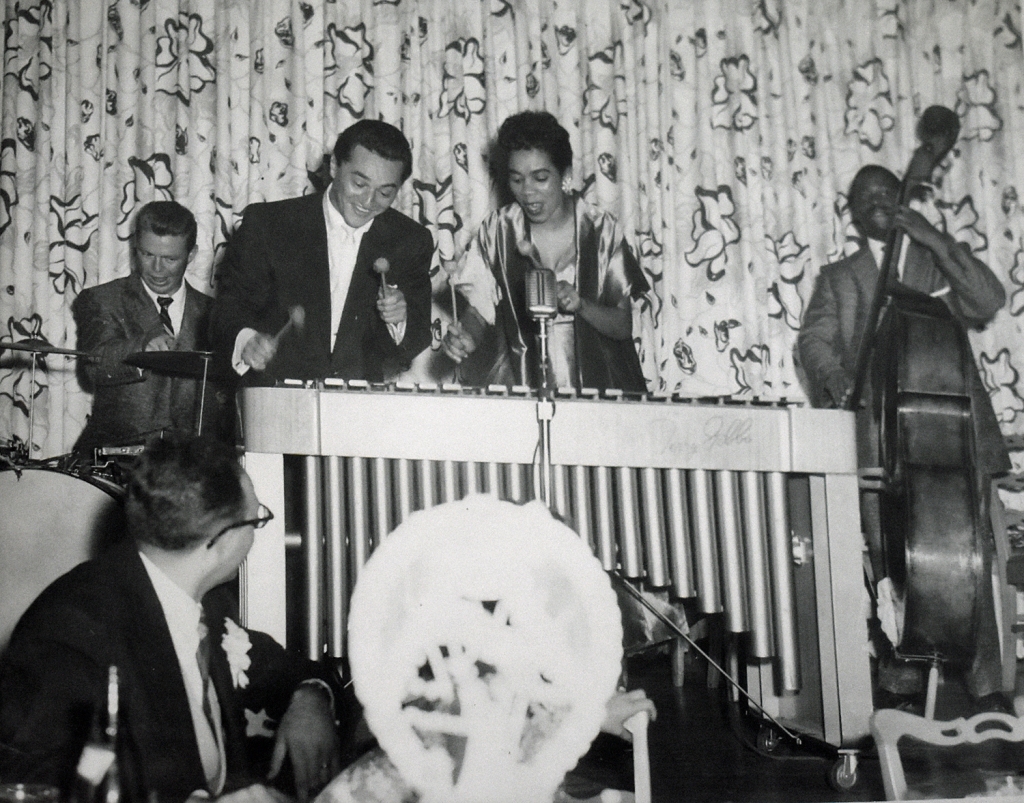
The wildest thing – I’ll tell you how I auditioned her, it’s a great story. Dizzy Gillespie and I were talking one day and he said, “If you ever get to Detroit, there’s a great trumpet player out there and his name is Thad Jones.”
It went out of my mind, I didn’t even think of it. Then, when I played Detroit, one of my friends I was in the Army with who lived in Pontiac, came down to see me. On my day off, I said, “Let’s go hear some music.” We looked in the paper and I saw the name, Thad Jones. I said, “I think that’s the guy Dizzy Gillespie told me about. Let’s go there – what have we got to lose?”
So, we went down to this little toilet of a club and the band were all unknown – Thad Jones, Elvin Jones, Billy Mitchell. And this girl piano player.
Now you’ve got to understand, in those days, the girl musicians were mostly piano players. You didn’t have trombone or trumpet players. It wasn’t feminine for some reason to play those instruments. The cliché was, “She was good, for a girl – they can play the piano well.” But they didn’t have that bebop feel, they didn’t have that dirt that Terry had.
My friend was also an ex-musician. I said to him, “Can you believe that?” I went up and got to talking to Terry Pollard. I said, “My name is Terry Gibbs and I’m a vibes-playing bandleader and I’d like you to play for me. Would you come to the club and audition?”
I picked her up one afternoon and we went to the club. When I audition somebody, I play the blues – the “I’ve Got Rhythm” chord changes, because anybody that can play jazz can play those chord changes.
I didn’t believe what she was playing, she was that good. Not many guys play that good. So then, I wanted to see how she’d accompany me on a ballad. I said, “Do you know the song, ‘You Don’t Know What Love Is?,’” not knowing that she didn’t know any standard songs from the American Songbook. She knew bebop and what Thad Jones wrote, because she worked with him.
She said, “No, but I’ll try.” I said, “Okay, hit an E minor seventh, flatted five.” And I turned around, to play a little obligato. She hit some chord that was wrong, and I thought she didn’t hear me. I said, “E minor seventh, flatted five.” And I turned around and once again, she hit some cockeyed chord, which had nothing to do with anything I asked her to do. I said, “E minor!” And she said, “I don’t know chord changes!”
I said, “How are we going to play?” She said, “Why don’t you just turn around and play the song?” So, I turned around to play and said, “Okay.” She played every chord to the song. Whatever she did, I didn’t believe it. She played all the notes and accompanied me. My bass player was looking at her left hand – he wouldn’t even know what chord she was playing. Usually, they play the root, the bottom part, the low part. But she just played the chords any way she heard it.
When we got done, I said, “That was great.” She said, “By the way, I play some vibes also.” I used to do that thing with Don Elliott that used to break up the place. So, I went and played the piano. Once again I played the blues and I didn’t believe what I was hearing, from a girl playing vibes. Milt Jackson was the only one that played that good. There were some other good vibes players, but not like Terry.
I wanted to go on the road, and she’d never been on the road, not with a white band. Now there was a guy called Bill Matney, a Black correspondent who was my friend, who used to write for the papers, and a big jazz fan. He happened to be in Detroit and he came down to see me when I was playing.
I said, “Bill, you’ve got to do me a favor. I’ve got to get this girl in the band. Go hear her with Thad Jones.” He said, “If you think she’s really that great. I’m going to help you get her.”
He called her mother, her father. We went to go see her pastor, and I promised her folks that my ex-wife, who was the same age as Terry, and I would make sure to take care of her and make sure nothing would happen. I hired her and put a band together. I also hired a Black bass player from Detroit called Herman Wright, not for any other reason than he played good.
You’ve got to understand this was 1953 and the Black situation was not good in a lot of places. And I’m very vocal about that. I was almost killed a million times, not because of what I would do but because of just having Terry there. They thought she was my wife. And sometimes, luckily, they thought she was with Herman.
When I hired Terry Pollard, I knew there may be trouble because of what was happening with the races. Hiring a Black musician was bad, but hiring a female Black musician was even worse. I must admit that I have a bad temper. If it’s something I think is wrong, I speak up hard.
Coming from Brooklyn, using certain language was never considered dirty words – it was just street talk. One time, we were playing in this club down South somewhere. We had just finished and the owner was standing there with two big goons and he said, “Hey Terry, come here. I’ve got an idea. Y’all without a doubt are the best attraction I’ve had in my club, and I’ll give you 16 weeks if you get rid of that coon on piano.”
It hit me to where I got that burning feeling I used to get when I boxed. And when I got that burning feeling, I got bad. I said, “You know what? I’ll get rid of that coon on piano if you get rid of your fat wife.” And I started to walk away, thinking, “This is the end of my life.”
But I couldn’t help it. I’ve always been that way about race. I never thought about race or even religion. I never married a Jewish girl, although I came from an Orthodox Jewish family. If you married out of the religion, you were dead to them. But I was the baby of the family and they accepted anything I did. I always felt as long as I wasn’t physically hurting somebody, I’m going to do what’s right for me. That cliché, you can’t make anyone happy unless you’re happy, is true.
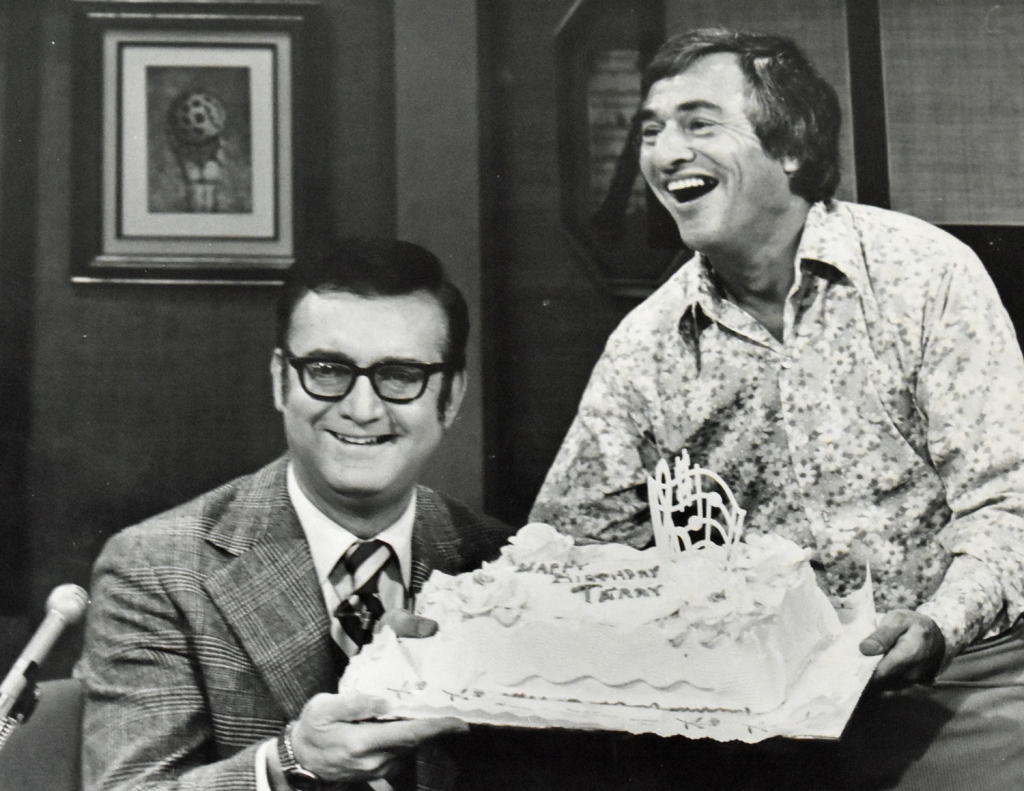
How were you chosen to become the musical director of “The Steve Allen Show”?
I got a call from California from one of the producers of “The Steve Allen Show.” Steve had an argument with Westinghouse, and quit on the spot. It was a syndicated show. In syndication, you could shoot six shows today and play them at different times in any city. Any city who bought the show could play it at any time they wanted to.
When Steve quit, they found a young kid from San Diego called Regis Philbin, completely unknown. I was living in New York at the time and got a call from the producer in California, who always liked what I did when I was a guest on “The Steve Allen Show.” He asked, “Could you conduct a television show?” I said, “I never had in my whole life.”
Steve was a friend of mine at that time, and I knew the routine of “The Tonight Show.” I said yes. I came in and had to meet Regis, he liked the rapport we had. I can’t help but put people on all the time. He loved that I was making silly jokes and because I was loose, it loosened him up a bit.
We only did 20 weeks of that show for the simple reason that the first two or three weeks, all the bookings were Steve Allen’s talent, and his talent was a lot of jazz – Sarah Vaughn, Carmen McRae, Oscar Peterson, Errol Garner, etc. That wasn’t Regis’ bag. Then we had talent that Regis could relate to, like Eartha Kitt and Don Rickles.
I wouldn’t come out to California unless they gave me a 26-week contract. Plus, I had to be on camera three times a week, playing with my sextet. The show was cancelled after 20 weeks, but I got paid for six weeks while doing nothing. Then from there, the guy who was one of the directors, started to work with Chuck Barris – who went on to do “The Gong Show” and “The Dating Game” – called me to be the musical director of a TV show called, “Operation Entertainment.”
We were going to do a variety show, like Bob Hope did in Vietnam. They were doing it with actual soldiers and sailors in this country. Chuck Barris called me and asked me if I wanted to do that show. So, I did “Operation Entertainment,” which we did for about 37 or 40 weeks. After that, I had no show.
Steve called me – by the way, I taught Steve how to play vibes and it used to break up the place. So, he had a booking in Las Vegas and asked if I’d like to be an act, where I’d play vibes and play two-finger piano, then I’d play a ballad and then he’d come on and we’d do the duet on vibes. It was like Barnum and Bailey. People used to scream when we got done.
In fact, it was so good that when we used to walk out the stage door or into the casino, people would say, “Mr. Allen, I never knew you could play vibes that good,” which made me a winner because I wasn’t there to make him look bad – I was there to make him look good.
While we were doing the show, he said to me, “I got a call today to start a TV show when we get done. Would you like to be musical director?” I said, sure. So, that started out and I was with him on and off for about 17 years.
What was it like to do a live TV show?
Doing “The Tonight Show” was like a guessing game all the time. We never rehearsed with anybody, Steve worked… everything came off the top of his head. He adlibbed the whole show, and we’d have to follow him.
I’d look at Paul Smith on piano, who was the best television piano player, and Frank Capp on drums. I could have done it with just the two of them. After doing that, we did like a Johnny Carson-style show for a while. Then Steve got called to do a variety show and he called me and asked me if I wanted to do it with a big band.
There was a producer who used to do jazz shows, and Steve liked him so he hired him. I went to the first meeting. They showed me the name of a band they wanted to use and I had a $5,000 salary, which is like $25,000 today.
And I said, “I don’t want the job.” Steve said, “Isn’t the money good?” I said, “Yeah. But you’re giving me a band with four lead trumpet players. Four of the best trumpet players in town, but they’re all used to playing lead trumpet. I need a guy who can play fourth trumpet, and third.
But after our discussion, I used my band. I used two or three guys they wanted, like Ray Brown and Herb Ellis. But I used my own band. It was wild.
We did that show. But then we went on to do some other things like nightclubs around the country. Then we did another variety show. Steve hired this director who used to do the “The Barbara Walters Show,” he was pretty big. And directors like to run everything. They hire everybody. Except when we went to this meeting – Steve had hired me and the director didn’t like that too much.
We had the first meeting – all the comedy writers and all the people in the show. I was leaving with Steve and he said to Russ, “By the way, Terry doesn’t take any direction from anybody,” and walked away.
So I said, “Russ, you’ve got to understand Steve’s sense of humor. He does a lot of ad-libbing. But you count me down, you’ll give me all the cues and we’ll get along well.”
Now in rehearsal, Steve thinks he’s doing “The Tonight Show.” The band is in another building and I’m working with earphones and monitors. They want to give me that separation from the band.
Steve doesn’t like to do punchlines that are written because he thinks the band is onstage, and he wants everybody onstage to laugh. So, Louis Nye and all the idiots that worked with him for years, they know his comedy, so they also ad-libbed. And the director got screwed up because he worked by script and he doesn’t hear Steve saying what is on the script.
So, now it comes to the first show. It starts out with some music and everything’s great. Now, the first comedy bit. There’s about a minute of talking and it’s coming to the first musical cue. And I know Steve’s not going to say it because he already said it – it’s like a jazz musician – “I already played it.”
I know he’s not going to say the line because I wouldn’t say that line – I already heard it. So now the director says, “Terry, there’s music coming up.” I said, “Alright.” He counts, “Ten, nine, eight… three, two, one… music!” And I didn’t come in, and Steve is ad-libbing and I knew it.
The director is looking at his script and doesn’t see the words that Steve is saying. He’s turning his pages, he’s confused – this guy who’s getting $20,000 a show, big money.
I knew Steve was ad-libbing, and I knew when he would be done, and then I came in with the music. And like a little kid, this guy who’s making all this money… he waited before the next comedy skit and he says, “Hey, Terry – you got it from here on in. You’ve got all the music cues.”
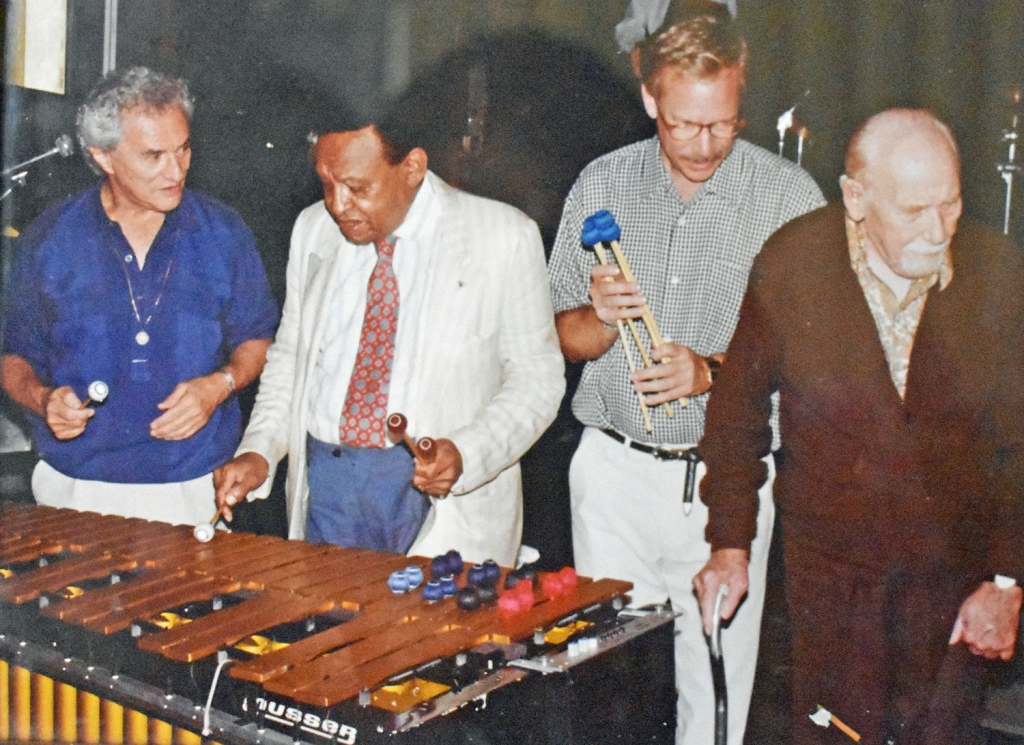
Coming from the bebop era and going on to great success in Hollywood with musicians who are often labeled as “West Coast jazz,” what do you think of that distinction between two seemingly different styles?
It’s stupid because all the musicians who live on the West Coast come from the East Coast. The thing is that it’s not the musicians. Everything is a lot looser here. The weather is conducive to wearing shirts like this, where New York, the moment you got up – in my day – you put on a shirt and tie and a jacket before you went outside.
The pace is so much faster in New York that it gives you that extra boost. Musicians – Shelly Manne, Shorty Rogers – these are the guys they say were responsible for West Coast jazz. They’re from New York City, from the Bronx.
If you didn’t say, “West Coast jazz,” you wouldn’t know it was West Coast jazz. Stan Getz, Gerry Mulligan – they all came from New York. They just played a style that was a little different than the hard swing. They played it easier.
How do you think jazz is represented in the rest of the world?
It’s a shame that it’s loved more in foreign countries than it is here. You get big audiences. We played Australia, Germany, big audiences. It’s become where there are players in foreign countries that play as well… but it all started here. There’s a certain flavor.
The young kids who go to college could read anything, the kids who study at Berklee or North Texas State College. But when they’re playing solos, there may be one or two out of the whole school that have that feel and flavor of trying to play like Charlie Parker or Dizzy Gillespie or Miles Davis. There is something missing. They can read. When we played Japan, the music was played perfectly by the musicians the first time. But you ask a guy to play a solo, it will be a little stiff, for lack of words. When an American jazz musician plays jazz, which is our music, it’s good.
What advice would you give young musicians today?
What I like to see with the young people sometimes is that even if it doesn’t call for it, get onstage dressed nice. They go onstage dressed with shirts… you can go onstage today and play Vegas clubs… there’s something missing when I see them play like this.
You’d go and see Oscar Peterson when he was with a trio – not only was he the greatest, but he would dress great, to where the music even sounded better for some reason. Mentally, it gave you that feeling, that you were going to see an artist.
What, after turning “93 years young,” would you say about your life?
I’ve been a blessed human being for 80 years of not wanting something. I never went to audition for a job – I got called all my life. I never thought I’d play with Benny Goodman but he called me. I never thought I’d play with Charlie Parker, but he came down to play with me.
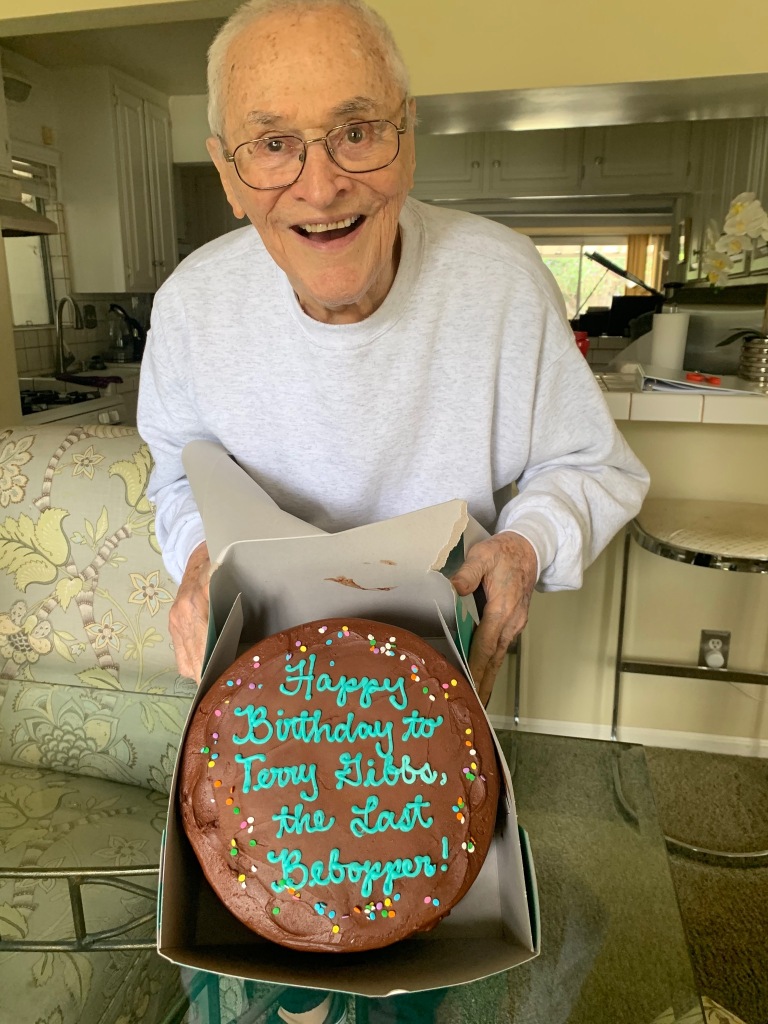
There’s nothing anymore that I would want to do that I haven’t done. I had the greatest big band in the world. That music today, is still being heard all over the world – it’s considered like a cult band. The music is being sold to colleges, all the foreign bands have it.
But all the bands I was in – the Woody Herman Band, the greatest band in the world at that time – if I go down the personnel, out of 17 guys, about nine or ten guys became successful in jazz or composing for the movies. The others became successful playing in [the] studios. But whatever they did, they became successful at it because it was that good of a band.
My life. I’ve been blessed. You know, I played with Benny Goodman, Charlie Parker, Dizzy Gillespie, Bud Powell. That era of musicians – whoever was great – more than anything, because I was hot in those days, I got a chance to hire people who later became famous … guys that like to play together. Fortunately for me, I could play better because I hired guys I wanted to play with. I liked their playing, which makes me play [better].
To me, the most important guy in the band is the drummer. Max Roach was in my band. I loved Art Blakey, he gave me that time. When I moved out here, I had Stan Levey, who played with Charlie Parker when he was 16 or 17, to give me that time. I had Mel Lewis in my Dream Band – best big band drummer at that time there was.
I’d like to make it to 94. I’m so happy and lucky and blessed to have 80 years of music and lucky that at my age, that I still hear music – that if I wanted to sit down and write something, that I could. Even though I’ve retired and haven’t touched those vibes since my last record date, “92 Years Young.” Whatever the last note was, the mallets are covered up and lie there. If I had to play again, I think it would take me a week and I’d be in good shape.
Sources and additional links:
Interview with Terry Gibbs, August 9, 2018
Interview with Terry Gibbs, September 2018
All About Jazz review of “92 Years Young: Jammin’ at the Gibbs House”
Terry Gibbs: Tales of a True Bebopper, JazzTimes, April 25, 2019
Terry Gibbs on “That Regis Philbin Show,” March 12, 1965
Terry Gibbs All-Star Band on “Steve Allen’s Music Room,” 1983
Phone interview with Terry Gibbs, August 14, 2020
Los Angeles Jazz Society, Terry Gibbs bio, 1997
Special thanks to Kirk Silsbee
I’m very tardy with this but i just wanted to congratulate you on this post, Joanie. Nice job, and keep swinging.
LikeLike
Thanks so much, Kirk, for your kind words and for making the introduction to Terry, it was a real kick to meet and interview him!…
LikeLike